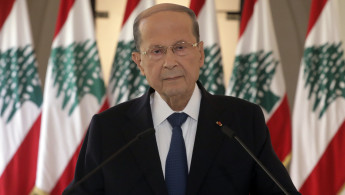Lebanon's president holds meetings to pick new prime minister with Hariri set to take post
Lebanon's President Michel Aoun has begun discussions to appoint the next prime minister of the crisis-hit country, Reuters has reported, with former premier Saad Hariri set to take the post.
President Aoun held meetings with parliamentarians on Thursday after weeks of political wrangling.
Saad Hariri resigned as prime minister in October 2019 in the wake of unprecedented street protests, but he is now expected to make a comeback at the helm of the next government.
Most parliamentary blocs have pledged their support, although Aoun and his Free Patriotic Movement are against the nomination.
However, the FPM's allies, the powerful Iran-backed Hezbollah movement and Amal, are expected to endorse Hariri.
Lebanon's next prime minister, the third in a year, will have to spearhead reforms and battle corruption, President Michel Aoun said on Wednesday.
Aoun was speaking at a televised news conference a day before his scheduled consultations with members of parliament to name Lebanon's new prime minister.
"I hope that you will think well about the consequences the nomination (of a premier) will have on the process of forming a government," Aoun said, addressing lawmakers.
It would affect "reform plans and international rescue initiatives", he said.
|
Limited demonstrations took place in central Beirut later Wednesday, with dozens of protesters shouting slogans against Hariri and the political elite.
They briefly faced off with supporters of the former premier, local media reported, and security forces stood between the groups to avoid an escalation.
Local media said Hariri supporters burned a giant cut-out of a clenched fist set up in central Beirut, but his party denied any involvement.
Unidentified perpetrators had previously burned down the protest symbol last November, but it was swiftly replaced.
Reforms 'blocked'
Lebanon has appointed two new premiers since Hariri resigned last year.
"Will the person who will have to bear the burden of being named and forming a government commit to addressing corruption and launching a reform drive?" Aoun asked.
Hassan Diab, a little-known academic, was named as Hariri's replacement last December.
His cabinet of so-called "technocrats" resigned following the huge 4 August blast at Beirut's port, widely blamed on government negligence.
Lebanon's worst peace-time disaster killed more than 200 people and injured at least 6,500 others.
Lebanon's ambassador to Berlin, Mustapha Adib, was named as premier later that month but bowed out in September over the failure of political leaders to agree on a cabinet line-up.
French President Emmanuel Macron, who has visited Beirut twice since the blast, said last month that the country's ruling class had "betrayed" its people by failing to form a new cabinet.
The process can take months in Lebanon, where consensus between most of the top political groups is required for major decisions.
Despite mounting international pressure, Lebanese parties are still bickering over the distribution of cabinet posts and portfolios.
Hezbollah and Amal, both Shia groups, have refused to relinquish control of the finance ministry, in what many say was behind Adib's failure to form a government.
Aoun on Wednesday also accused unnamed officials of blocking reforms long demanded by international donors, including power-sector reform and a forensic audit of the central bank.
Follow us on Facebook, Twitter and Instagram to stay connected





 Follow the Middle East's top stories in English at The New Arab on Google News
Follow the Middle East's top stories in English at The New Arab on Google News
![The UAE is widely suspected of arming the RSF militia [Getty]](/sites/default/files/styles/image_330x185/public/2024-11/GettyImages-472529908.jpg?h=69f2b9d0&itok=Yauw3YTG)
![Netanyahu furiously denounced the ICC [Getty]](/sites/default/files/styles/image_330x185/public/2024-11/GettyImages-2169352575.jpg?h=199d8c1f&itok=-vRiruf5)
![Both Hamas and the Palestinian Authority welcomed the ICC arrest warrants [Getty]](/sites/default/files/styles/image_330x185/public/2024-11/GettyImages-2178351173.jpg?h=199d8c1f&itok=TV858iVg)